英语的起源英文版
- 格式:doc
- 大小:30.00 KB
- 文档页数:3
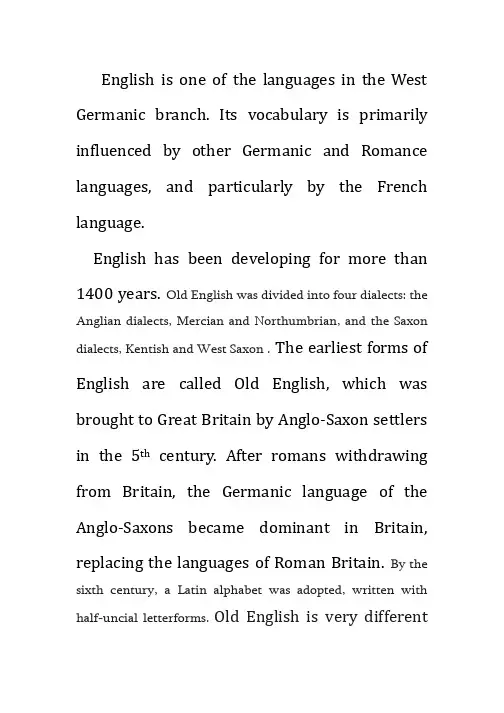
English is one of the languages in the West Germanic branch. Its vocabulary is primarily influenced by other Germanic and Romance languages, and particularly by the French language.English has been developing for more than 1400 years. Old English was divided into four dialects: the Anglian dialects, Mercian and Northumbrian, and the Saxon dialects, Kentish and West Saxon . The earliest forms of English are called Old English, which was brought to Great Britain by Anglo-Saxon settlers in the 5th century. After romans withdrawing from Britain, the Germanic language of the Anglo-Saxons became dominant in Britain, replacing the languages of Roman Britain.By the sixth century, a Latin alphabet was adopted, written with half-uncial letterforms. Old English is very differentfrom Modern English and difficult for 21st-century English speakers to understand.Middle English began with the conquest of England by the Norman in 1066 and developed further in the period from 1200 to 1450,and was a period in which the language was influenced by French.In the period from the 8th to the 12th century, Old English gradually transformed through language contact into Middle English. During the Middle English period many Old English grammatical features were simplified or disappeared. Middle English developed out of Late Old English, seeing many dramatic changes in its grammar, pronunciation and orthography. In the 14th century, English became dominant in Britain again. By the end of the 14th century, the dialect of London had emerged as the emergedas the standard dialect of what we now call Middle English. By the 12th century Middle English was fully developed, integrating both Norse and Norman features; it continued to be spoken until the transition to early Modern English around 1500.The next period in the history of English was Early Modern English. English began to rise in prestige during the reign of Henry V. Early Modern English began in the late 15th century with the introduction of the printing press to London and the King James Bible, and the start of the Great Vowel Shift. All these factors had a major impact on the English language, especially on its vocabulary. The major source language was Latin, but loans from other languages, in particular French were also frequent. Literature from the Early Modern period included the works of William Shakespeare and King FamesBible influenced on the development of the English language during the last decades of the Renaissance.By 1750 most of the Old English irregular verbs had either dropped out of use or become regular. In this period, adjectives lost all endings except for in the comparative and superlative forms. And there were also a great many semantic changes, as old words acquired new meanings.By the late 18th century, the British Empire had facilitated the spread of English through its colonies and geopolitical dominance.Settlers from Britain moved across the world from Britain moved across the world, the Modern English changed and developed, and took in words from other local languages. With theincrease in the communication, travel, radio and television, all these different types of English have mixed. So English continues to change and develop, with hundreds of new words appearing every year. A major feature in the early development of Modern English was the codification of explicit norms for standard usage, and their dissemination through official media such as public education and state sponsored publications.As the USA emerged as one of the economic powers of the 20th century, American English has become a dominant variety of the language. In terms of grammatical evolution, Modern English has now reached a stage where the loss of case is almost complete.。
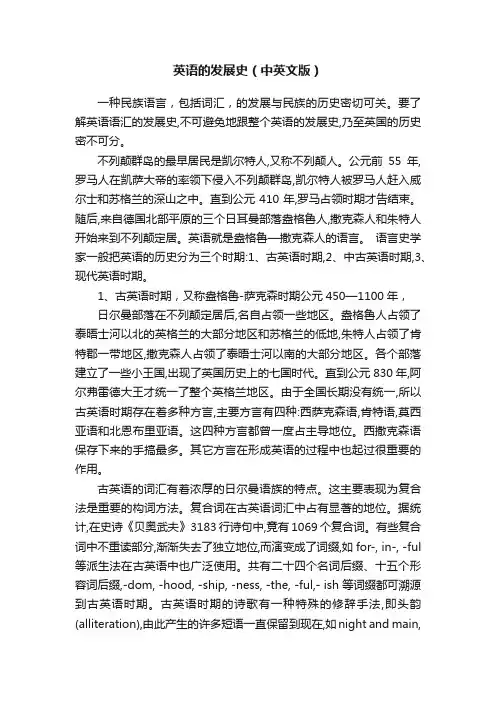
英语的发展史(中英文版)一种民族语言,包括词汇,的发展与民族的历史密切可关。
要了解英语语汇的发展史,不可避免地跟整个英语的发展史,乃至英国的历史密不可分。
不列颠群岛的最早居民是凯尔特人,又称不列颠人。
公元前55年,罗马人在凯萨大帝的率领下侵入不列颠群岛,凯尔特人被罗马人赶入威尔士和苏格兰的深山之中。
直到公元410年,罗马占领时期才告结束。
随后,来自德国北部平原的三个日耳曼部落盎格鲁人,撒克森人和朱特人开始来到不列颠定居。
英语就是盎格鲁—撒克森人的语言。
语言史学家一般把英语的历史分为三个时期:1、古英语时期,2、中古英语时期,3、现代英语时期。
1、古英语时期,又称盎格鲁-萨克森时期公元450—1100年,日尔曼部落在不列颠定居后,名自占领一些地区。
盎格鲁人占领了泰晤士河以北的英格兰的大部分地区和苏格兰的低地,朱特人占领了肯特郡一带地区,撒克森人占领了泰晤士河以南的大部分地区。
各个部落建立了一些小王国,出现了英国历史上的七国时代。
直到公元830年,阿尔弗雷德大王才统一了整个英格兰地区。
由于全国长期没有统一,所以古英语时期存在着多种方言,主要方言有四种:西萨克森语,肯特语,莫西亚语和北恩布里亚语。
这四种方言都曾一度占主导地位。
西撒克森语保存下来的手搞最多。
其它方言在形成英语的过程中也起过很重要的作用。
古英语的词汇有着浓厚的日尔曼语族的特点。
这主要表现为复合法是重要的构词方法。
复合词在古英语词汇中占有显著的地位。
据统计,在史诗《贝奥武夫》3183行诗句中,竟有1069个复合词。
有些复合词中不重读部分,渐渐失去了独立地位,而演变成了词缀,如for-, in-, -ful 等派生法在古英语中也广泛使用。
共有二十四个名词后缀、十五个形容词后缀,-dom, -hood, -ship, -ness, -the, -ful,- ish 等词缀都可溯源到古英语时期。
古英语时期的诗歌有一种特殊的修辞手法,即头韵(alliteration),由此产生的许多短语一直保留到现在,如night and main,friend or foe, a labour of love。
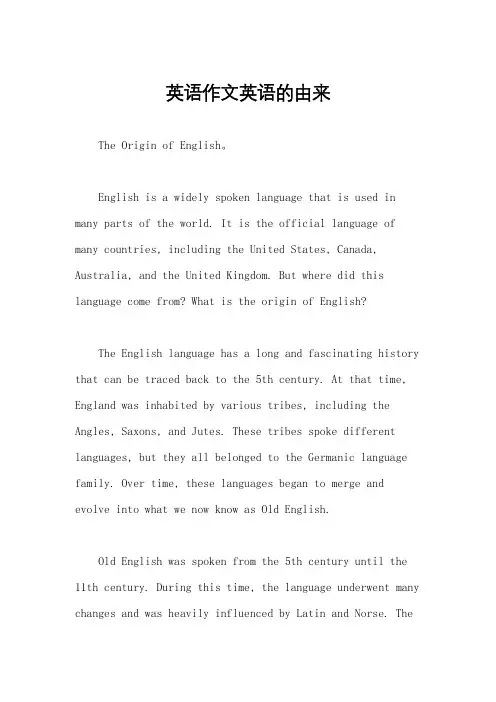
英语作文英语的由来The Origin of English。
English is a widely spoken language that is used in many parts of the world. It is the official language of many countries, including the United States, Canada, Australia, and the United Kingdom. But where did this language come from? What is the origin of English?The English language has a long and fascinating history that can be traced back to the 5th century. At that time, England was inhabited by various tribes, including the Angles, Saxons, and Jutes. These tribes spoke different languages, but they all belonged to the Germanic language family. Over time, these languages began to merge and evolve into what we now know as Old English.Old English was spoken from the 5th century until the 11th century. During this time, the language underwent many changes and was heavily influenced by Latin and Norse. Themost famous work of Old English literature is Beowulf, an epic poem that tells the story of a hero who battles monsters and dragons.In the 11th century, the Norman Conquest of England brought about a major change in the English language. The Normans spoke a dialect of Old French, and their language began to influence English. This led to the development of Middle English, which was spoken from the 11th century until the 15th century.During the Middle English period, English underwent many changes and became more standardized. The printing press was invented in the 15th century, and this helped to spread the language even further. The most famous work of Middle English literature is Chaucer's Canterbury Tales, a collection of stories told by pilgrims on their way to Canterbury.In the 16th century, the English language underwent another major change with the Renaissance. This period saw a renewed interest in classical learning, and many newwords and phrases were borrowed from Latin and Greek. This led to the development of Early Modern English, which was spoken from the 16th century until the 18th century.During the Early Modern English period, many of the features of modern English began to emerge. The first English dictionary was published in 1604, and the King James Bible was published in 1611. Shakespeare also wrote many of his plays during this time, and his works helped to standardize the language even further.In the 18th century, the English language continued to evolve, and many new words and phrases were added. This led to the development of Modern English, which is the language we speak today. Modern English is a global language that is spoken by millions of people all over the world.In conclusion, the English language has a long and fascinating history that can be traced back to the 5th century. From the merging of various Germanic languages to the influence of Latin and French, English has undergonemany changes and has become the global language that we know today.。
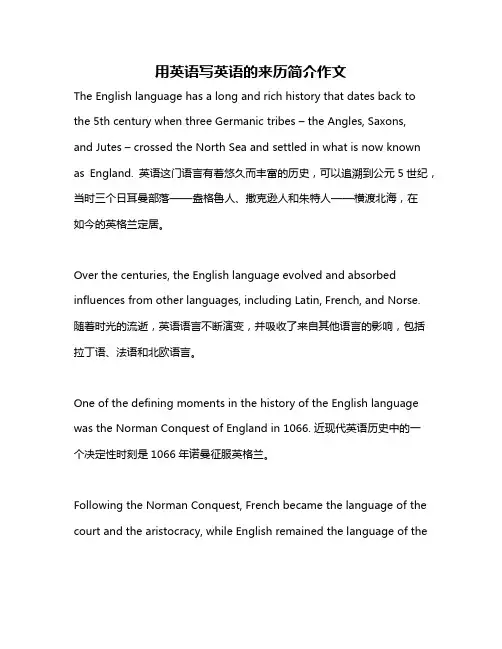
用英语写英语的来历简介作文The English language has a long and rich history that dates back to the 5th century when three Germanic tribes – the Angles, Saxons,and Jutes – crossed the North Sea and settled in what is now known as England. 英语这门语言有着悠久而丰富的历史,可以追溯到公元5世纪,当时三个日耳曼部落——盎格鲁人、撒克逊人和朱特人——横渡北海,在如今的英格兰定居。
Over the centuries, the English language evolved and absorbed influences from other languages, including Latin, French, and Norse. 随着时光的流逝,英语语言不断演变,并吸收了来自其他语言的影响,包括拉丁语、法语和北欧语言。
One of the defining moments in the history of the English language was the Norman Conquest of England in 1066. 近现代英语历史中的一个决定性时刻是1066年诺曼征服英格兰。
Following the Norman Conquest, French became the language of the court and the aristocracy, while English remained the language of thecommon people. 在诺曼征服之后,法语成为了法庭和贵族的语言,而英语仍然是普通民众的语言。
The influence of French on English was significant, with thousands of French words being adopted into the English vocabulary. 法语对英语的影响是巨大的,成千上万的法语词汇被纳入了英语词汇表中。
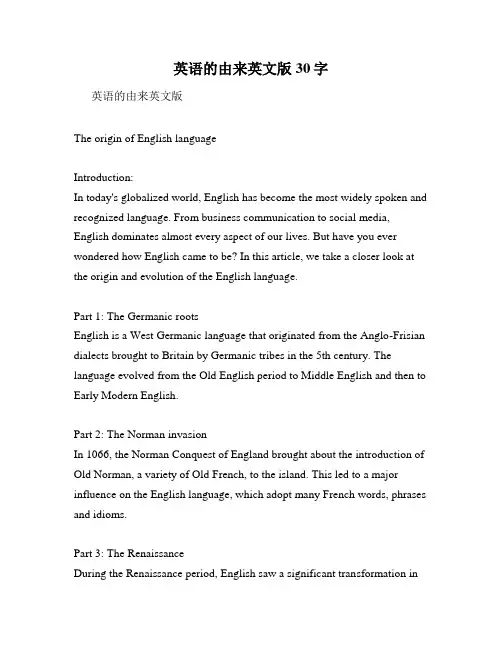
英语的由来英文版30字英语的由来英文版The origin of English languageIntroduction:In today's globalized world, English has become the most widely spoken and recognized language. From business communication to social media, English dominates almost every aspect of our lives. But have you ever wondered how English came to be? In this article, we take a closer look at the origin and evolution of the English language.Part 1: The Germanic rootsEnglish is a West Germanic language that originated from the Anglo-Frisian dialects brought to Britain by Germanic tribes in the 5th century. The language evolved from the Old English period to Middle English and then to Early Modern English.Part 2: The Norman invasionIn 1066, the Norman Conquest of England brought about the introduction of Old Norman, a variety of Old French, to the island. This led to a major influence on the English language, which adopt many French words, phrases and idioms.Part 3: The RenaissanceDuring the Renaissance period, English saw a significant transformation inits vocabulary, grammar and spelling. This was due to the revival of classical learning and the widespread use of printing press that helped standardize the language across the country.Part 4: The colonial eraWith the growth of the British Empire, English became a global language as it spread across the world. The language absorbed new words and expressions from different cultures, leading to the development of regional dialects and accents.Part 5: Modern EnglishToday, English continues to evolve and adapt to changing times and cultures. With the emergence of technology and the internet, the language has seen the creation of new words and phrases, and the rise of internet slang and abbreviations.Conclusion:English is a language that has undergone many changes and transformations throughout history. From its Germanic roots to its global dominance, the language continues to shape and be shaped by the world we live in.。
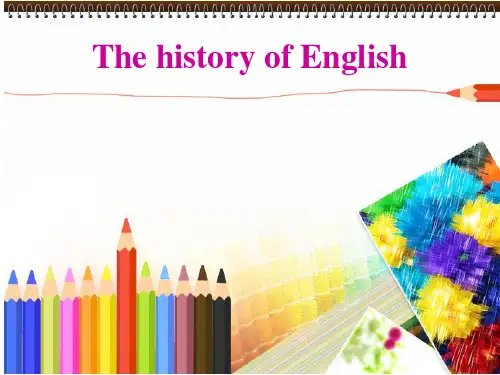
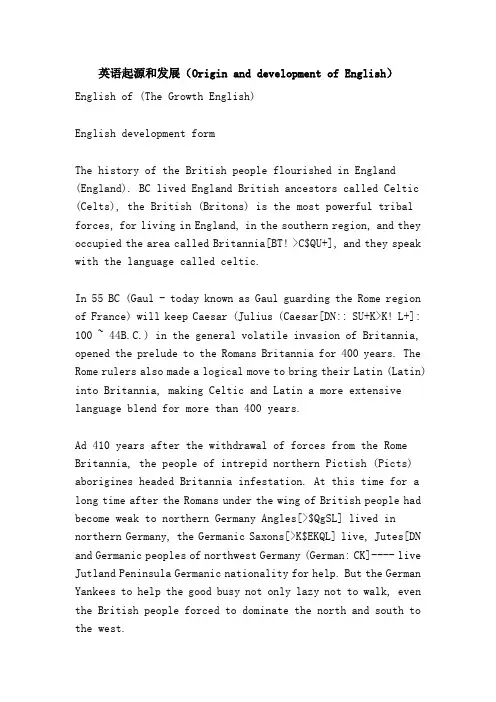
英语起源和发展(Origin and development of English)English of (The Growth English)English development formThe history of the British people flourished in England (England). BC lived England British ancestors called Celtic (Celts), the British (Britons) is the most powerful tribal forces, for living in England, in the southern region, and they occupied the area called Britannia[BT! >C$QU+], and they speak with the language called celtic.In 55 BC (Gaul - today known as Gaul guarding the Rome region of France) will keep Caesar (Julius (Caesar[DN:: SU+K>K! L+]: 100 ~ 44B.C.) in the general volatile invasion of Britannia, opened the prelude to the Romans Britannia for 400 years. The Rome rulers also made a logical move to bring their Latin (Latin) into Britannia, making Celtic and Latin a more extensive language blend for more than 400 years.Ad 410 years after the withdrawal of forces from the Rome Britannia, the people of intrepid northern Pictish (Picts) aborigines headed Britannia infestation. At this time for a long time after the Romans under the wing of British people had become weak to northern Germany Angles[>$QgSL] lived in northern Germany, the Germanic Saxons[>K$EKQL] live, Jutes[DN and Germanic peoples of northwest Germany (German: CK]---- live Jutland Peninsula Germanic nationality for help. But the German Yankees to help the good busy not only lazy not to walk, even the British people forced to dominate the north and south to the west.These Yankees from Germany, the Angles family is the most numerous potential, and the occupied Britannia renamed Angleland[>$RgSS$QD], and later, Angleland's name has changed to England[>, RgS+QD]. The language used by Angles is called Englisc[>, RgS, KE], Lu, and on the one hand it begins to blend with Celt +Latin, and on the other hand, the popularity of its tribe has spread over Angleland. Linguists refer to the language used in Angleland during this period as Old English (Old English).By the middle of the 1000, the British royal family had inherited the throne. At this time it faces northwest France the English Channel (Normandy: Normandy[>Q& P+QD! ") in William and the Duke of Normandy (William [>V! SU+P]), which relies on virgin blood advocate the right to inherit the throne of England, was forced into the UK in 1066, this history is called the Norman Conquest (the Norman Conquest), and Prince William it is called William the Conqueror (William the Conqueror). Of course, French also flowed into England with the Norman, and during this period blended with "Celt + Latin + Angles/Saxon", forming the Middle English.After the The Norman Conquest for about 400 years, with the progress of the times, such as religious movement, the Anglo American folk literature rise, poetry and drama of embryonic development, as well as the Renaissance, the invention of printing, colonial competition, has the following significant changes in the development of english.1. a large vocabulary of Latin (Greek) and french.The morphological changes of 2. complex endings disappeared.3., the localization of local vocabulary.4., the disappearance of the gender inherent mark of nouns.5., to meet the needs of language and the development of the times, flexible absorption of foreign words.All these factors have evolved and formed the norms and characteristics of modern english. When linguists study the development of English, they usually differentiate modern English into early modern English (Early Modern English) and late modern English (Late Modern English).Second modern English (Modern English)With the development of modern English in this century, we can get a general picture of the whole of the following three points.A. vocabulary in modern English (Vocabulary)The vocabulary structure of modern English is as follows:(a) local vocabulary (i.e., Angle-Saxon): approximately 1/5 of the vocabulary of modern English and the majority of the everyday basic language, for example:Dog (dog), cow (cow), fish (FISH), bread (bread),Bed (bed), and, of, on, for, etc.(b) Latin vocabulary (including Greek) refers to the Latin word "Latin" meaning, accounting for about 3/5 of the vocabulary structure of modern English, that is, more than half. That's why today when we study English, there are many words that can be helped by Latin roots (Root),The reason for a prefix (Prefix), or suffix (Suffix), such as "student", "family"":"Studere - (enthusiastic, learning)" + "-ent" - student"Familia - (family)" + "-y" (noun) - familyFrench provides Latin into English to the sidewalk, of course itself into many, for example: Dinner (dinner), fruit (fruit), soup (soup), fork (fork), nation (National), Encore (encore, Encore), etcThe vocabulary of modern English can also be created in the light of the progress of the times, and the Latin or Greek roots are often used at this time. For example, the word "television" was coined in 1907""Tele (and beyond Greek roots)" + "-vision" (visual field - Latin suffix) - television.(c) foreign language: English foreign language about the structure of modern English vocabulary 1/5, its language isalso an impressive array of European countries, to borrow from all over the world language and its colonial language more. Such as:Italy:piano (Gang Qin), Violin (violin), etc.Spain:cigar (Xue Qie), mosquito (mosquitoes), etc.Arabia:coffee (coffee), zero (zero), etc.China:tea (tea), typhoon (typhoon), ctc.B. usage of modern english:Modern English can be divided into different levels in the world:(a) mother tongue (Mother tongue): native English speaking countries include the United Kingdom, the United States, Canada (including French), Australia, New Zealand and so on, using a population of about 350 million people.(b) (Second language) common language: English for public English speaking countries across five continents, all hosted former British colonies and the United States, the use of population estimated (by day terms can pass as the base) is about 2 billion 500 million. Of these 2 billion 500 million, English language proficiency is about 60 million.(c): in addition to the foreign language (a) (b) two, the world's other countries almost all English is the firstimportant foreign language in school education system in order to provide required courses or elective students learning. In Europe alone, according to a survey of 1991~1992 years old students aged 15 to 24 years old, English is the first important foreign language, with up to 83% of the learners. It is estimated that the English language is foreign, but more than 100 million people are fluent in speaking, writing and reading.The application of C. modern EnglishIn accordance with the evaluation criteria of modern language application value, namely, culture, education, economy, politics, science and technology, transportation, media and other aspects of the world's breadth and depth to assess, in today's world no second languages and English.Culture: Publications representing human knowledge and ideas each year, accounting for more than half of the world's publications by English publishers.Education: there are few regular universities in the world that do not have an English department or a graduate school, but there are so many students or scholars engaged in the study of English that no other language can look at them.Economy: Global trade activities and economic activities that affect human life are dominated by english.Politics: the United Nations, although identified in Britain, France and Russia, Spain and other five languages for the five largest language in the world, but the United Nations affairsexecutive with English as first language. Between the countries in the world political statement, talks, with English as the original agreement.Science and technology: global scientific and technological activities and data, dominated by English, are estimated to be around 70%. So far as the most advanced Inter-Net is available, without English is illiteracy.Traffic: the Russian Airlines entered the airport in Cairo, Egypt, and the German Airlines flight flew into the Japanese air district. The language they used to exchange flights was not Russian, German or japanese. They must all use english. Maritime traffic is also true.Media: five continents, no matter where the identity of the English language, public or foreign language, there are English newspapers or magazines in distribution or circulation, radio or television station have English programs in the broadcast, broadcast, or by listening to the program.In the light of all the listed above, English has undoubtedly been recognized as the most widely used, the most applied and the most efficient Esperanto language in the world today.Third sections of British English and American English(British, English, and, American, English)In the process of development of early modern English originally there is no British English and American English(BritishEnglis----BrE) (American English AmE) of the division, but in twentieth Century, because the United States began to participate in world affairs, to the second world war more fully demonstrated the strong force in playing a leading role on the world stage, Americans naturally speak English all over the world, even in the United Kingdom have attracted attention, considerable discussion and research from all walks of life.So, since the beginning of the seventeenth Century, when the British came to America with the colonial trend of the new world into America, what changes have taken place in the new environment for about four hundred years to form today's American English?According to the study of linguists, there are three main reasons:(1) snowclones: those colonists to the new world to cope with the new environment and the original word refers to the new things around that approximate. For example, "corn" in Britain means "grain", especially a region's staple grain, which means "wheat" ("wheat") in britain". But at that time the British people to see in the new world, the Indians are not the staple food grains of wheat and corn (maize), but then they still call to "corn", and in front of a "Indian" in contrast to the British "corn". This "Indian corn" use case first appeared in 1697, and later "Indian" gradually "no", and only "corn" directed at "corn"". Today we say "popcorn" for "pop-corn", absolutely no one says "pop-Indian-corn"".(2) in situ absorption of Aboriginal Language: AmE has absorbeda lot of Native American vocabulary, with more names of plants and animals and geographical names. Such as:Name: Ohio[o (>O%! O (] Ohio (originally referred to the Ohio River, beautiful is water "); Mississippi[P! K! >K! A!" (originally referred to the Mississippi River Mississippi, Father is of waters "); Kentucky[E+Q>C) E!] Kentucky (land of tomorrow). Etc.Animal name: moose[P (K]:: raccoon[T->E (Q]: moose; raccoons; skunk[KE) RE] skunks; etc.Botanical name: hickory[>O! E+T! "Hickory; sequoia[K! >EV&! Squash[KEV&M] +] Sequoia; pumpkin like; etc.(3) shift group: a new blend of the national language, early colonists and the founding of the United States after the naturalization of immigrants to the United States not only from the UK, the number of immigrants actually from European countries around the world and far beyond the british. These immigrants from all over the world continue to blend their native language with English, which is one of the main causes of the AmE. Such as:Chop-suey[>CM&A>su:i]: chop (a meat or chicken, onions and Steamed Rice American Chinese dishes, from Cantonese, Webster's dictionary has been officially included)Long time no see: long time no see (included in NIC's, Dictionary, of, American, English, Phrases, Idioms, Essential, American, II)Some linguists worry that the dividing line between BrE and AmE will grow as time goes by. But since the end of the two World War after half a century, because of the traffic, and the rapid development of information media and communication, the fact is that BrE and AmE have also followed the differences between each other blend, more and more narrow. For example, AmE "fall (Qiu Tian), OK (All right), etc." in Britain today is also very smooth, in turn BrE lift (lift), sweets (candy), etc. "in the United States there is no misfits phenomenon (details refer to the twenty-fourth chapter).Today, the trend of English Teaching in the mainland is still in the BrE dominated stage, but in the expected future, AmE will tend to increase its impact with the increasing activity of Americans on the mainland.。
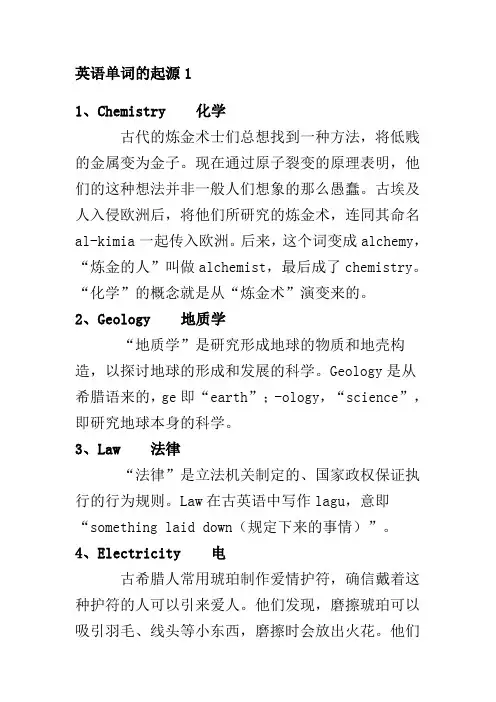
英语单词的起源11、Chemistry 化学古代的炼金术士们总想找到一种方法,将低贱的金属变为金子。
现在通过原子裂变的原理表明,他们的这种想法并非一般人们想象的那么愚蠢。
古埃及人入侵欧洲后,将他们所研究的炼金术,连同其命名al-kimia一起传入欧洲。
后来,这个词变成alchemy,“炼金的人”叫做alchemist,最后成了chemistry。
“化学”的概念就是从“炼金术”演变来的。
2、Geology 地质学“地质学”是研究形成地球的物质和地壳构造,以探讨地球的形成和发展的科学。
Geology是从希腊语来的,ge即“earth”;-ology,“science”,即研究地球本身的科学。
3、Law 法律“法律”是立法机关制定的、国家政权保证执行的行为规则。
Law在古英语中写作lagu,意即“something laid down(规定下来的事情)”。
4、Electricity 电古希腊人常用琥珀制作爱情护符,确信戴着这种护符的人可以引来爱人。
他们发现,磨擦琥珀可以吸引羽毛、线头等小东西,磨擦时会放出火花。
他们就把这种磨擦起电的现象叫做elektron。
来自希腊语elektor,意即“发光的太阳”,进入拉丁语后写作electrum。
英语演变为electricity。
5、Atom 原子古希腊人认为,特质是不可能无限止地分割下去的,越分越小,最后小到不可再分。
他们把“原子”叫做atomos:a即“not”;tomos ,“cut”意即“不能再分割”以后这个词在英语中演变为atom。
尽管后来发现“原子”并非“不可再分割”,然而约定俗成,“原子”的名字仍然以atom流传下来。
6、Uranium 铀“铀”是一种放射性金属元素,化学符号为U,主要用来产生原子能。
著名的物理学家居里夫人曾用铀作实验,发现了放射现象。
Uranium这个词是从希腊神话中一位神的名字来的。
1781年,英籍德国天文学家赫瑟尔(Sir William Herschel)发现了颗尚未被人们发现的行星,于是他就借用了希腊神话中“天王”Ouranos的名字,命名这颗行星为Uranus。
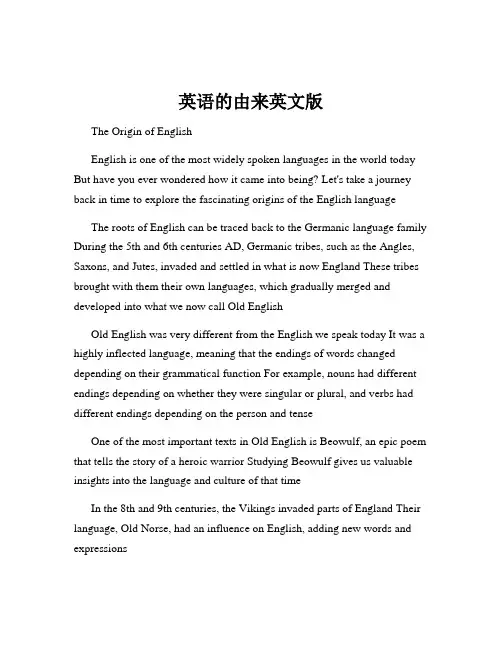
英语的由来英文版The Origin of EnglishEnglish is one of the most widely spoken languages in the world today But have you ever wondered how it came into being? Let's take a journey back in time to explore the fascinating origins of the English languageThe roots of English can be traced back to the Germanic language family During the 5th and 6th centuries AD, Germanic tribes, such as the Angles, Saxons, and Jutes, invaded and settled in what is now England These tribes brought with them their own languages, which gradually merged and developed into what we now call Old EnglishOld English was very different from the English we speak today It was a highly inflected language, meaning that the endings of words changed depending on their grammatical function For example, nouns had different endings depending on whether they were singular or plural, and verbs had different endings depending on the person and tenseOne of the most important texts in Old English is Beowulf, an epic poem that tells the story of a heroic warrior Studying Beowulf gives us valuable insights into the language and culture of that timeIn the 8th and 9th centuries, the Vikings invaded parts of England Their language, Old Norse, had an influence on English, adding new words and expressionsThen, in 1066, the Norman Conquest brought a significant change The Normans, who spoke Norman French, became the ruling class French became the language of the court and the nobility, while English was mainly spoken by the common people This led to a large number of French words entering the English language, especially in areas such as law, government, and cuisineOver time, English continued to evolve and change The Great Vowel Shift, which took place between the 14th and 17th centuries, had a major impact on the pronunciation of vowels in English This made the language sound quite different from its earlier formsThe invention of the printing press in the 15th century also had a significant effect It made it easier to produce and distribute books, which helped to standardize the language and spread it more widelyDuring the Age of Exploration and the growth of the British Empire, English came into contact with many other languages around the world This led to the borrowing of words from languages such as Arabic, Hindi, and Chinese, further enriching the vocabulary of EnglishToday, English is a global language used in business, science, entertainment, and many other fields It continues to change and adapt as new technologies and cultural influences emergeThe history of English is a story of invasion, conquest, borrowing, and evolution It shows how a language can develop and change over time to meet the needs of its speakers Understanding the origin of English helps us appreciate its complexity and diversity, and also gives us a better understanding of the cultures and histories that have shaped it。
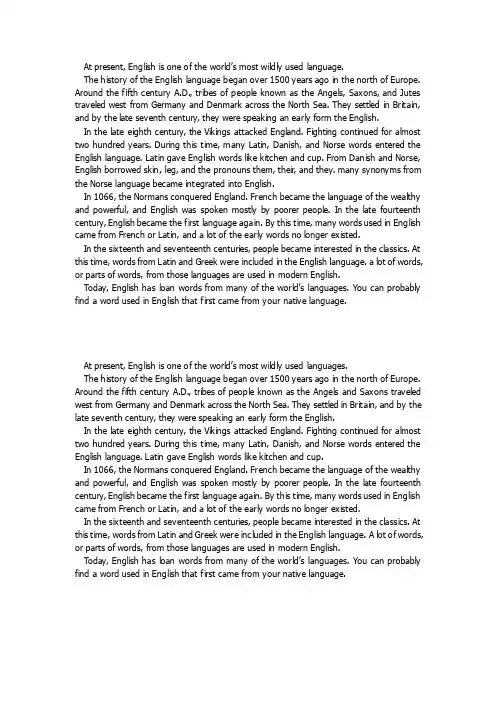
At present, English is one of the world’s most wildly used language.The history of the English language began over 1500 years ago in the north of Europe. Around the fifth century A.D., tribes of people known as the Angels, Saxons, and Jutes traveled west from Germany and Denmark across the North Sea. They settled in Britain, and by the late seventh century, they were speaking an early form the English.In the late eighth century, the Vikings attacked England. Fighting continued for almost two hundred years. During this time, many Latin, Danish, and Norse words entered the English language. Latin gave English words like kitchen and cup. From Danish and Norse, English borrowed skin, leg, and the pronouns them, their, and they. many synonyms from the Norse language became integrated into English.In 1066, the Normans conquered England. French became the language of the wealthy and powerful, and English was spoken mostly by poorer people. In the late fourteenth century, English became the first language again. By this time, many words used in English came from French or Latin, and a lot of the early words no longer existed.In the sixteenth and seventeenth centuries, people became interested in the classics. At this time, words from Latin and Greek were included in the English language. a lot of words, or parts of words, from those languages are used in modern English.Today, English has loan words from many of the world’s languages. You can probably find a word used in English that first came from your native language.At present, English is one of the world’s most wildly used languages.The history of the English language began over 1500 years ago in the north of Europe. Around the fifth century A.D., tribes of people known as the Angels and Saxons traveled west from Germany and Denmark across the North Sea. They settled in Britain, and by the late seventh century, they were speaking an early form the English.In the late eighth century, the Vikings attacked England. Fighting continued for almost two hundred years. During this time, many Latin, Danish, and Norse words entered the English language. Latin gave English words like kitchen and cup.In 1066, the Normans conquered England. French became the language of the wealthy and powerful, and English was spoken mostly by poorer people. In the late fourteenth century, English became the first language again. By this time, many words used in English came from French or Latin, and a lot of the early words no longer existed.In the sixteenth and seventeenth centuries, people became interested in the classics. At this time, words from Latin and Greek were included in the English language. A lot of words, or parts of words, from those languages are used in modern English.Today, English has loan w ords from many of the world’s languages. You can probably find a word used in English that first came from your native language.English, the United Kingdom of Great Britain and Northern Ireland, the United States of America's official language, but also by many former British colony, as well as countries of the Commonwealth as a common language or a second language, according to the English pronunciation, vocabulary and grammatical differences in the characteristics of English into Britain and the United States.English Source:English belong to the Indo-European family of Germanic languages of West Germanic, from the ancient continent of migrants from Europe to Great Britain's Anglo-Saxons and Jutes Germanic tribes who said the language evolved, through the British colonial activities spread to All over the world. According to the English-speaking size, the English may be the world's fourth-largest or third largest language (Statistics for 1999 were 322,000,000), but it is the world's most extensive second language. Last two centuries, Britain and the United States in the cultural, economic, military, political and scientific leadership in making English a universal language. English is the working language of the United Nations.And English is the closest to the Frisian; the language was still in the Netherlands in the northern province of Friesland about 50 million people. Some people think that Scotland and the English language is close to an independent language, and some people think it is a dialect of English. Scots traditionally been considered as a separate language, and some people even think that Ebonics is a separate language, but it is very controversial. In addition to the Frisian closest to the English outside the Netherlands is in the eastern part of Germany and the northern lowlands of the Saxon. Other related languages include Dutch, Afrikaans and German. Norman Conquest of England in the 11th century, a lot of French words, greatly enriched the English language.English history:Early Germanic tribes’ people immigration to England and English is the language from their inherited changes. In return, he gave the Anglo community in southeastern territory. He also sought further support, family-Saxon, Anglo ethnic Serbs and Jutes come. "Chronicle" documented the end of these "immigrants" have established the Kingdom of the seven: Innocent Bo Lila, Mercia, East and Battipaglia, Kent, Essex, Sussex, Wessel. Germans after the invasion, the rule of the Celtic peoples, the main local language in Scotland, Wales, Cornwall and Ireland down to survive. These invaders of the language gradually formed the "Old English", and like most modern Frisian. English (England, English), England (England) and East Anglia is the three words were painted from the Anglo-term development of communities: English, Anglican, England.Norman Conquest in 1066 after 300 years, the only French king of England. Therefore, a large number of French words into Old English, Old English itself has lost most of the tw ists and turns, for the evolution of Middle English. In 1500 about the Great Vowel over to Middle English to Modern English deformation. Old English literature's most famous works are "Beowulf" is the Middle English of "The Canterbury T ales."Modern English in Shakespeare's prosperity and the beginning of the period, a number of scholars will be divided into early modern English and late Modern English, as the div iding line in 1800 or so. As in most parts of the world to the British occupation and colonization,the local language to a large extent, also influenced the development of English.文案编辑词条B 添加义项?文案,原指放书的桌子,后来指在桌子上写字的人。
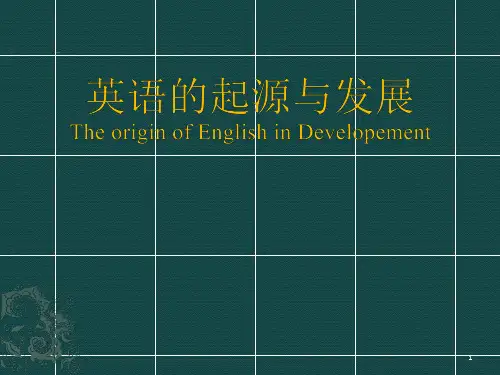
English is a Germanic language family Indo-European in the West Germanic language branch. English, that is Great Britain's Anglo-Saxon language, it is under the influence of various factors, have been developed, enriched and gradually standardization.English is divided into three periods:Old English period (5th century -12 century)Middle Ages (12th century -16 century)Modern English period (16th century - present)Old English period (5th century -12 century):English involves the formation of three foreign invasion and a cultural revolution. In short, this language is ANGLES, Saxons and JUTES three Germanic tribes to the British's. Augustine and the early Christian leaders who chase after the British had converted to Christianity, the language accepted influence of Latin and Greek, Danish people are skillfully enrich the language, and finally by the French-speaking Normans it to transform.5 century (about AD 449 years) living in the north-western Europe's three Germanic tribes Angles, Saxons, Jutes invaded the British Isles after another batch of these Germanic tribe belong to the Indo-European language spoken - West Germanic language family . Very close to each other. They used a technique called Runic text. This text is the ancient Germanic people’s common language, but also species from the ancient Greek and Latin words developed in the Nordic monument. With the development of human society,Angles, Saxons and Jutes gradually formed a unified English nation. Their respective dialects gradually integrated with the emergence of a new language - (Anglo-Saxon) this is the Old English.597, Christian admitted to the United Kingdom, along with a large number of Latin words into the United Kingdom.AD 793, the Nordic Viking invasion of Britain. Anglo - Saxon Nordic collectively referred to as those "Danes". Danish invasion of English influence: to simplify the English language, expression greatly enhanced.In 1066, Normans conquered England; the English language has undergone yet another conflict. In 300 years, the French (the language of the conquerors) really became a British court, aristocracy, social and literary language, but language cannot be conquered people, English is still in use and development. Norman King of England's ruling does not prohibit the language of the British people; they are also trying to learn English. To twelve century, English has become the British community spoken of the common people.Middle Ages (12th century -16 century):From the 13th century, English literature in the creation of ethnic parties in the region have made there. Although the Latin and French is still used as a literary language, but the important creative works are written in English. From the latter half of the 13th century, English gradually replaced French and Latin. 1382, religious reformer, John Wycliffe professor of theology at Oxford University will be (The Bible) from Latin into English, and publicly advocate the use of English in church worship.Modern period (16th century - present):Renaissance, in order to express new things, new ideas, a lot of British writers and scholars have borrowed Greek, Latin, French, Italian, Spanish vocabulary, and boldly to create new words, new language.17th and 18th century English gradually toward standardization.1755, (Samuel Johnson, 1709-1784) editor (A Dictionary of the English language) come out.The early 19th and 20th centuries the use of English is more than ever determined, more consistent.。
英语的起源及发展The Origins and Development of the English LanguageThe starting point of the English language can be traced back to the arrival of three Germanic tribes to Britain in the5th century AD: the Angles, Saxons, and Jutes. These tribes brought their respective dialects to the region, which eventually merged to form what is known as Old English. This early form of English was heavily influenced by the indigenous Celtic languages spoken by the Britons.The next significant phase in the development of the English language occurred with the Norman Conquest of England in 1066. The Normans, who spoke a variety of Old French, brought with them their language and culture, which had a profound impact on the English language. This event marked the beginning of the Middle English period.During the Middle English period, English went through extensive changes in its vocabulary, grammar, and pronunciation. The influence of French introduced a large number of loanwords into English, particularly in areas such as law, government, and the arts. English also underwent significant simplifications in its grammar, losing many of the inflected endings that characterized Old English.One of the most notable literary works of this period is Geoffrey Chaucer's Canterbury Tales, which showcases the transition of English from Old English to Middle English. Chaucer's work is regarded as a masterpiece and is seen as a pivotal moment in the development of the English language.The Modern English period began in the late 15th century and was marked by the standardization and codification of the language. With the introduction of the printing press by William Caxton in 1476, written English became accessible to a wider audience. This led to the establishment of various dialects and regional variations, which eventually coalesced to form Standard English.The English language continued to evolve during the Renaissance period, with the rebirth of classical learning and the influx of new scientific ideas. This led to an influx of Latin and Greek loanwords into English, enriching its vocabulary and expanding its capacity to be used in academic and scientific contexts.In the 20th century, the development of technology and the rise of the United States as a global power further cemented the dominance of English. English became the language of science, business, and diplomacy, ensuring its global influence.。
**The Origins of the English Language**The English language, spoken by millions around the globe, has a rich and complex history. Its development is a fascinating journey through time, reflecting various cultural, social, and historical influences.The origins of English can be traced back to the early Germanic tribes of Northern Europe. The language began to take shape around the 5th century AD, when Anglo-Saxons—comprising the Angles, Saxons, and Jutes—migrated from what is now Germany and Denmark to the British Isles. They brought with them their Germanic dialects, which formed the basis of Old English.Old English was significantly influenced by the Viking invasions of the 8th and 9th centuries. Norse-speaking Vikings settled in parts of England and interacted with the local Anglo-Saxon population. This interaction led to the incorporation of many Norse words into Old English, enriching its vocabulary and laying the groundwork for the language’s evolution.The next major influence on English came with the Norman Conquest of 1066. When William the Conqueror, Duke of Normandy, defeated King Harold II of England, the Norman French-speaking ruling class introduced a wealth of Norman vocabulary into the English language. This period marked the transition from Old English to Middle English, characterized by significant changes in grammar, pronunciation, and vocabulary.During the Middle English period, which lasted from the 12th to the 15th centuries, English underwent considerable transformation. The language absorbed many Latin and French words, particularly in fields such as law, art, and literature. Geoffrey Chaucer, a prominent writer of this era, is best known for his work “The Canterbury Tales,” which provides valuable insight into the language and society of the time.The transition from Middle English to Modern English began in the late 15th century and continued into the 17th century. This period was marked by the Great Vowel Shift, a major change in the pronunciation of English vowels. Additionally, the invention of the printing press by Johannes Gutenberg in the 15th century played a crucial role in standardizing English spelling and grammar, making literature and written communication more accessible. Modern English, as we know it today, emerged around the late 17th century. It has continued to evolve, incorporating words from many languages due to British colonial expansion and global trade. The spread of English through colonization, exploration, and trade has made it a global lingua franca, spoken and studied around the world.In conclusion, the English language has evolved through a complex interplay of historical events, cultural exchanges, and linguistic developments. From its Germanic roots to its current status as a global language, English reflects the diverse influences that have shaped its development over centuries. Understanding the origins of English helps us appreciate its rich heritage and the dynamic nature of language.。
英语的起源与发展The Origin and Development of EnglishIntroduction:English, as we know it today, is a widely spoken language that serves as a lingua franca in many parts of the world. It has a rich history that dates back thousands of years and has undergone various changes and influences throughout its development. In this essay, we will explore the origin and evolution of English, from its earliest beginnings to the present day.Origins of English:The roots of English can be traced back to a West Germanic language spoken by tribes in what is now northern Germany and southern Denmark in the 5th and 6th centuries. These tribes, known as the Anglo-Saxons, eventually migrated to Britain and brought their language with them. This language, known as Old English, was the precursor to the modern English we speak today.Evolution and Influences:Over the centuries, English went through significant transformations, both in terms of vocabulary and grammar. One of the most influential events in the evolution of English was the Norman Conquest in 1066 when William the Conqueror, a Norman Duke, invaded England and established a new ruling class. TheFrench-speaking Normans brought with them their language, which fused with Old English to create Middle English. During this period, English borrowed a large number of French words, greatly enriching its vocabulary.The Renaissance and Early Modern English:Standardization and Globalization:During the 17th and 18th centuries, efforts were made to standardize English, mainly through the publication of dictionaries and grammar books. This period also saw the establishment of English as a global language due to the British Empire's expansion. English spread to various parts of the world through colonization and trade, leading to the development of different varieties of English, such as American English, Australian English, and Indian English.Modern English:Conclusion:。
英语的起源英文作文The origin of the English language can be traced back to the 5th century, when Germanic tribes invaded Britain and brought their language with them. Over time, this Germanic language evolved and absorbed influences from Latin, Norse, and French, resulting in the language we now know as English.English has a rich and diverse vocabulary, with words borrowed from various languages such as Latin, French, and Greek. This borrowing of words has enriched the language and contributed to its flexibility and adaptability.The spread of the British Empire in the 17th and 18th centuries played a significant role in the global influence of the English language. English became the language of trade, diplomacy, and education, leading to its widespread use and adoption as a second language in many countries.The invention of the printing press in the 15th centuryalso contributed to the standardization and spread of the English language. With the ability to mass-produce books and documents, English became more accessible to a larger audience, further solidifying its position as a global language.The influence of technology and the internet in the modern era has also shaped the evolution of the English language. The use of social media, texting, and online communication has led to the creation of new words, expressions, and abbreviations, reflecting the dynamic nature of the language.。
英语的起源与发展简史The Origin and Evolution of English: A Brief History.English, a language that has captivated the world, has a rich and fascinating history. Its origin can be traced back to the 5th century when the Anglo-Saxons, a Germanic tribe, settled in Britain. Over the centuries, English has evolved and transformed,吸收 influence from various languages and cultures, 最终 becoming the global language of communication.The Early Stages: Anglo-Saxon England.The earliest form of English, known as Old English or Anglo-Saxon, was brought to Britain by the Anglo-Saxons. This language, which was closely related to other Germanic languages such as German and Dutch, was the predominant language in England until the Norman Conquest of 1066. During this period, English was primarily used for religious, legal, and administrative purposes.The Norman Conquest and the Influence of French.The Norman Conquest brought significant changes to English. The Normans, who were French-speaking, introduceda large number of French words and phrases into the language. This influx of French vocabulary and grammar hada profound impact on English, resulting in the developmentof Middle English. Middle English, which emerged in the11th century, was a hybrid language that combined Anglo-Saxon vocabulary with French grammar and syntax.The Renaissance and the Standardization of English.The Renaissance period, which began in the 14th century, marked a significant turning point in the history of English. During this time, there was a renewed interest in classical literature and languages, which led to the widespread adoption of Latin and Greek words into English. Additionally, the printing press, invented in the 15th century, allowed for the widespread dissemination of books and literature, further promoting the standardization anddevelopment of English.The 16th and 17th centuries saw further changes in English. The Protestant Reformation led to the translation of the Bible into English, making the language more accessible to the common people. Shakespeare, a renowned playwright and poet, used a rich vocabulary and innovative grammar in his works, which significantly contributed to the development and refinement of Modern English.The Global Spread of English.The global spread of English can be attributed to the British Empire's colonial expansion. As the British Empire expanded throughout the 18th and 19th centuries, English became the lingua franca of the Empire, serving as the common language of communication between the colonizers and the colonized. This led to the widespread adoption of English in countries such as the United States, Canada, Australia, and India.The 20th and 21st centuries saw the further ascendancyof English as the global language of communication. The advent of the internet and globalization has accelerated the spread of English, making it the most widely spoken language in the world. English is now used in international business, politics, education, and culture, and it is the official language of numerous countries and international organizations.In conclusion, the history of English is a fascinating tapestry of cultural exchange and linguistic evolution. From its humble beginnings as a Germanic tribal language to its current status as the global language of communication, English has transformed and adapted, drawing influence from various sources and reflecting the rich diversity of human history and culture.。
At present, English is one of the world’s most wildly used language.The history of the English language began over 1500 years ago in the north of Europe. Around the fifth century A.D., tribes of people known as the Angels, Saxons, and Jutes traveled west from Germany and Denmark across the North Sea. They settled in Britain, and by the late seventh century, they were speaking an early form the English.In the late eighth century, the Vikings attacked England. Fighting continued for almost two hundred years. During this time, many Latin, Danish, and Norse words entered the English language. Latin gave English words like kitchen and cup. From Danish and Norse, English borrowed skin, leg, and the pronouns them, their, and they. many synonyms from the Norse language became integrated into English.In 1066, the Normans conquered England. French became the language of the wealthy and powerful, and English was spoken mostly by poorer people. In the late fourteenth century, English became the first language again. By this time, many words used in English came from French or Latin, and a lot of the early words no longer existed.In the sixteenth and seventeenth centuries, people became interested in the classics. At this time, words from Latin and Greek were included in the English language. a lot of words, or parts of words, from those languages are used in modern English.Today, English has loan words from many of the world’s languages. You can probably find a word used in English that first came from your native language.At present, English is one of the world’s most wildly used languages.The history of the English language began over 1500 years ago in the north of Europe. Around the fifth century A.D., tribes of people known as the Angels and Saxons traveled west from Germany and Denmark across the North Sea. They settled in Britain, and by the late seventh century, they were speaking an early form the English.In the late eighth century, the Vikings attacked England. Fighting continued for almost two hundred years. During this time, many Latin, Danish, and Norse words entered the English language. Latin gave English words like kitchen and cup.In 1066, the Normans conquered England. French became the language of the wealthy and powerful, and English was spoken mostly by poorer people. In the late fourteenth century, English became the first language again. By this time, many words used in English came from French or Latin, and a lot of the early words no longer existed.In the sixteenth and seventeenth centuries, people became interested in the classics. At this time, words from Latin and Greek were included in the English language. A lot of words, or parts of words, from those languages are used in modern English.Today, English has loan w ords from many of the world’s languages. You can probably find a word used in English that first came from your native language.English, the United Kingdom of Great Britain and Northern Ireland, the United States of America's official language, but also by many former British colony, as well as countries of the Commonwealth as a common language or a second language, according to the English pronunciation, vocabulary and grammatical differences in the characteristics of English into Britain and the United States.English Source:English belong to the Indo-European family of Germanic languages of West Germanic, from the ancient continent of migrants from Europe to Great Britain's Anglo-Saxons and Jutes Germanic tribes who said the language evolved, through the British colonial activities spread to All over the world. According to the English-speaking size, the English may be the world's fourth-largest or third largest language (Statistics for 1999 were 322,000,000), but it is the world's most extensive second language. Last two centuries, Britain and the United States in the cultural, economic, military, political and scientific leadership in making English a universal language. English is the working language of the United Nations. And English is the closest to the Frisian; the language was still in the Netherlands in the northern province of Friesland about 50 million people. Some people think that Scotland and the English language is close to an independent language, and some people think it is a dialect of English. Scots traditionally been considered as a separate language, and some people even think that Ebonics is a separate language, but it is very controversial. In addition to the Frisian closest to the English outside the Netherlands is in the eastern part of Germany and the northern lowlands of the Saxon. Other related languages include Dutch, Afrikaans and German. Norman Conquest of England in the 11th century, a lot of French words, greatly enriched the English language.English history:Early Germanic tribes’ people immigration to England and English is the language from their inherited changes. In return, he gave the Anglo community in southeastern territory. He also sought further support, family-Saxon, Anglo ethnic Serbs and Jutes come. "Chronicle" documented the end of these "immigrants" have established the Kingdom of the seven: Innocent Bo Lila, Mercia, East and Battipaglia, Kent, Essex, Sussex, Wessel. Germans after the invasion, the rule of the Celtic peoples, the main local language in Scotland, Wales, Cornwall and Ireland down to survive. These invaders of the language gradually formed the "Old English", and like most modern Frisian. English (England, English), England (England) and East Anglia is the three words were painted from the Anglo-term development of communities: English, Anglican, England.Norman Conquest in 1066 after 300 years, the only French king of England. Therefore, a large number of French words into Old English, Old English itself has lost most of the twists and turns, for the evolution of Middle English. In 1500 about the Great Vowel over to Middle English to Modern English deformation. Old English literature's most famous works are "Beowulf" is the Middle English of "The Canterbury Tales."Modern English in Shakespeare's prosperity and the beginning of the period, a number of scholars will be divided into early modern English and late Modern English, as the dividing line in 1800 or so. As in most parts of the world to the British occupation and colonization,the local language to a large extent, also influenced the development of English.。